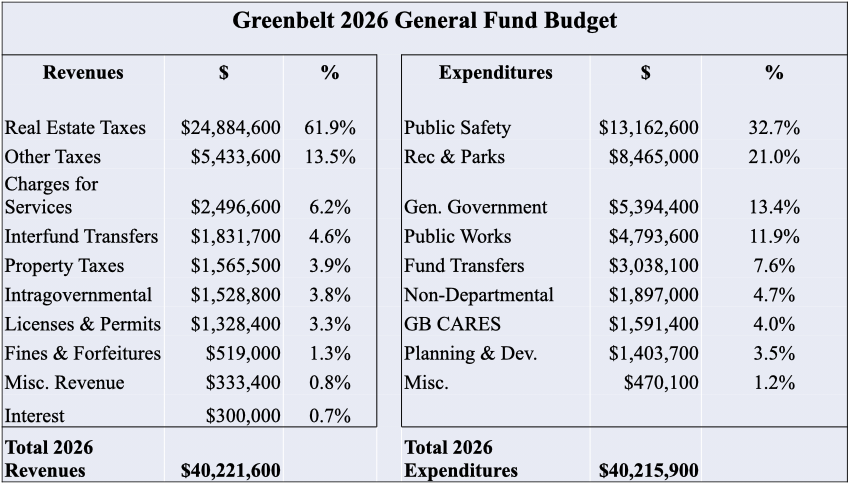At its November 23 regular meeting the Greenbelt City Council is expected to vote on three ordinances that would prohibit evictions, late fees and rent increases and impose substantial penalties for non-compliance. At the November 9 council meeting, Mayor Colin Byrd introduced for first reading an ordinance that would prohibit landlords from filing for evictions for failure to pay rent and to impose a fine of $500 per day for each separate violation on landlords who violate the ordinance.
Byrd also announced his intent to introduce two related ordinances at the November 23 meeting, one prohibiting landlords from assessing late fees and one prohibiting rent increases. He plans to move to suspend the rules to permit those ordinances to be approved in a single meeting. The rent-freeze ordinance also calls for a $500 per day fine for each separate violation while the late-fee-freeze ordinance calls for a fine of $200 per day per violation. All three ordinances would be in effect between the date of adoption and December 31, 2021. Unlike Governor Larry Hogan’s order, none of the proposed ordinances limit the scope of the law to tenants who have suffered a substantial loss of income due to Covid-19.
The late-fee ordinance also would require apartment owners and/or property managers to provide the city with a monthly report on the number of tenants 60 days or more behind on their rent. All three ordinances are available on the city’s website in the agenda packet for the November 9 meeting. Byrd had wanted to introduce the ordinances for first reading but several councilmembers reported not having received the emailed text of the proposed ordinances in time to review it.
The late-fee and rent-increase ordinances apply only to landlords with more than 10 units. The eviction ordinance does not, however, exempt small landlords.
Byrd pressed council to move fast, though he bristled at Councilmember Silke Pope’s characterization of the process as “rushed”. His intention is to have the freezes in effect before December rents are due.
A Better Way?
City Solicitor Todd Pounds told council that, right now, the best approach for a tenant facing eviction is to present the Centers for Disease Control and Prevention (CDC) order which says: “a landlord, owner of a residential property, or other person with a legal right to pursue eviction or possessory action, shall not evict any covered person from any residential property in any jurisdiction to which this Order applies during the effective period of the Order.” He said that if a tenant presents the CDC form to a judge, that ends the procedure. Liz Park, director of Greenbelt CARES, said her staff is assisting residents in completing these forms.
Background
Byrd had introduced what he called an ordinance that would freeze evictions between the date of adoption and February 27 at the October 26 regular meeting. Councilmembers Judith Davis and Emmett Jordan both raised objections regarding Byrd having bypassed the normal procedure. If a councilmember wants to propose legislation, usually council will first discuss it in a worksession and when introduced for first reading, the text would be couched in legal format. Instead, what Byrd introduced at that time was not presented as an ordinance, just a paragraph of intent.
Subsequent steps were also the reverse of the normal process. Normally, a worksession would precede a public hearing, but in this case, council held a public hearing on Thursday, November 5, followed by a worksession on the matter. The public hearing and worksession only concerned the eviction freeze, not the rent and late fee freezes. The draft ordinance discussed at the worksession did not provide for penalties.
Jurisdiction
It is not clear whether the ordinance would be enforceable. Pounds reported that Chief Judge Mary Ellen Barbera has opened up the courts under the governor’s deferral to local jurisdictions as to when to reopen. The county courts, he said, are following a policy of no evictions, rent increases or late fees while under a state of emergency. Actions filed regarding tenants already in arrears before the pandemic are being adjudicated, he said.
Landlords
Several councilmembers expressed concern about the impact on landlords. Pope pointed out that they have bills to pay, as well, especially those with just a few properties. She disclosed that she owns one unit for her future use that she is currently renting out. Following the state law is the best approach, she said. She and Councilmember Edward Putens explained that a landlord may have a mortgage and be required to pay fees such as condominium, cooperative or homeowners association fees on the rental unit. Pounds said that if the ordinance passes, landlords could not pass along increases in their costs, such as for electricity. “Rent is rent,” he said.
Landlords cannot apply for business assistance. Instead, the CARES Act funding that assists tenants in paying their rent is how landlords get help. Park said that landlords have been equally as pleased as tenants with Greenbelt’s funding. In fact, landlords are often applying on behalf of their tenants, she said.
Enforcement
Pounds said that it is not clear how a local ordinance would be viewed. Judges are following a policy that state law controls landlord-tenant issues and will do so unless they are told otherwise. His recommended course, if council passes the eviction freeze, is that he would send letters to Barbera and several other judges asking for guidance. The city could also go to the county circuit court requesting a temporary restraining order. However, he could not assure council that the judge would grant the restraining order. The judge might instead direct the city to follow state law until the judge is informed otherwise. Even if successful, this process could take 12 to 18 months. Pounds said that freezes on late fees and rent increases have not been addressed by anyone.
Gilberto Cabrera, supervisory inspector in the Department of Planning and Community Development, noted that it would take a lot to come up with an enforcement process. Once the city issues a citation, the issue goes to the county landlord-tenant court and the city has no further involvement in the matter.
Council Reaction
Putens felt providing tenants with information on their options would be more useful than passing an ordinance where state law, rather than this ordinance, would be enforced. Pope and Davis expressed concerns about the potential legal costs the city would incur, both from trying to convince the courts to observe it and from paying Pounds to act as prosecutor in landlord-tenant court.
Byrd and Councilmember Rodney Roberts felt it was a fight worth having. Councilmember Emmett Jordan worried that the law would simply be window dressing, rather than actually helping residents. He said that the mechanics of the freeze would be difficult and complicated. Councilmember Leta Mach’s views were unclear as she continued to have problems with unmuting herself. When Byrd revealed that he was considering adding substantial penalties on landlords for non-compliance, Pope stated that she would not vote for an ordinance that involved penalties.
Going Forward
The draft eviction ordinance is significantly different from what was originally reviewed in the worksession. It is unclear whether councilmembers would support the penalty provisions.



